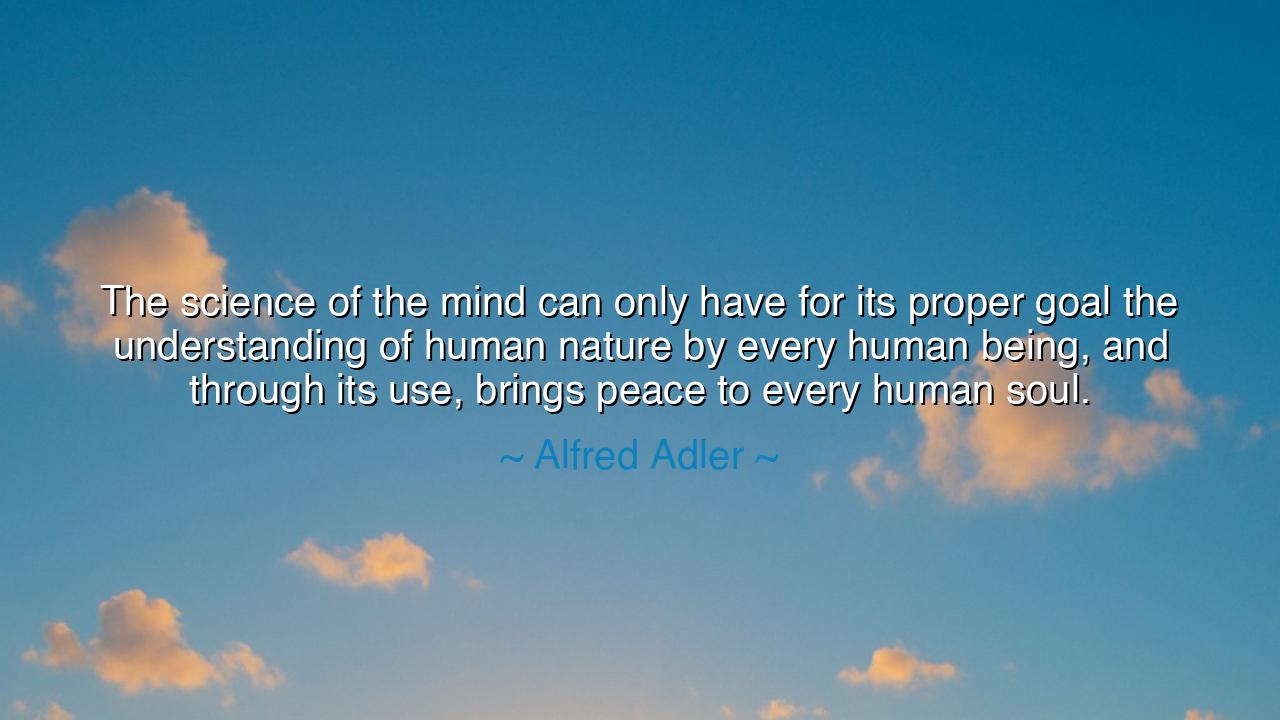
The science of the mind can only have for its proper goal the
The science of the mind can only have for its proper goal the understanding of human nature by every human being, and through its use, brings peace to every human soul.






Hear, O Seekers of Wisdom, the words of Alfred Adler, whose understanding of the mind and the human spirit offers us a profound truth. "The science of the mind can only have for its proper goal the understanding of human nature by every human being, and through its use, brings peace to every human soul." In these words, Adler reveals the true purpose of the science of the mind—to understand the deepest workings of the human spirit and to use that understanding to bring peace to all who seek it. The science of the mind is not a detached study of behavior or cognition, but a pathway to the heart of human nature, a key that unlocks the doors of understanding, healing, and compassion.
In the ancient world, the philosophers were the first to seek an understanding of the human soul. Socrates, with his unyielding pursuit of self-examination, urged us to "Know thyself," for he understood that understanding the mind and spirit was the foundation of a virtuous and peaceful life. His method of questioning, known as the Socratic method, was designed not merely to uncover knowledge, but to foster understanding, to bring clarity to the confusion of the soul. Plato, too, in his dialogues, sought to understand the nature of the self, the divine spark within every person. Just as the ancient philosophers sought to understand human nature, Adler carries forward this tradition, reminding us that true understanding of the mind leads to the peace we so deeply desire.
Adler’s words call us to recognize that the science of the mind is not a pursuit for academics alone, but a path for all—a journey that leads to the understanding of human nature in its fullness. This science is not about reducing the complexity of the mind to mere facts and figures, but about embracing the profound truths that lie within each of us. Consider, O Seekers, the life of Carl Jung, whose work in depth psychology explored the unconscious mind, the archetypes, and the collective unconscious. Jung’s quest was not to merely catalog the behaviors of the human race, but to understand the universal symbols and patterns that shape us all, to bring us closer to understanding the nature of the soul. In this way, Adler’s philosophy mirrors Jung’s in that both sought to bring understanding and peace to the individual through a deep awareness of the mind and its intricate workings.
Adler’s vision was revolutionary in that he saw the mind not as an isolated phenomenon but as something that is inherently connected to the broader human experience. He believed that understanding human nature was essential not only for the individual but for the greater community. Just as the ancient healers and shamans understood that peace within the individual brings peace to the tribe, so Adler recognized that understanding the mind is the key to creating peace in the world. When one gains insight into their own thoughts, emotions, and behaviors, they can then live in harmony with others, creating a world of balance and unity.
Take, for instance, the life of Viktor Frankl, whose experiences in the concentration camps during World War II led him to develop the concept of logotherapy, which emphasizes finding meaning in life as the key to mental health and peace. Frankl, in his darkest moments, found that understanding the mind and recognizing one’s capacity for meaning could bring an individual peace even amidst suffering. Adler’s words resonate with Frankl’s approach—both sought not only to understand the human mind but to empower the individual to create their own peace, to foster a deep connection with their true self and with others.
The lesson, O Seekers, is clear: the science of the mind is not a tool for mere intellectual pursuit but a path to peace. Understanding human nature, with all its complexities and contradictions, is the key to unlocking the peace within ourselves and in our interactions with others. Adler’s vision reminds us that by understanding our own minds, we can cultivate greater empathy, compassion, and self-awareness, bringing peace not only to the individual but to the collective. The study of the mind is, therefore, not a pursuit that ends with theory or observation, but one that transforms us, bringing us closer to a state of inner peace and harmony with the world.
So go forth, O Seekers, and understand that the true purpose of science—whether in the realm of the mind, the heart, or the universe—is not simply to acquire knowledge, but to apply that knowledge in the service of peace. The understanding of human nature must be a guiding force in all our lives, for when we understand ourselves, we can bring peace to the world. Embrace the teachings of Adler, and let them guide you to a deeper awareness of your own mind, and in turn, help you bring peace to the world around you.






AAdministratorAdministrator
Welcome, honored guests. Please leave a comment, we will respond soon